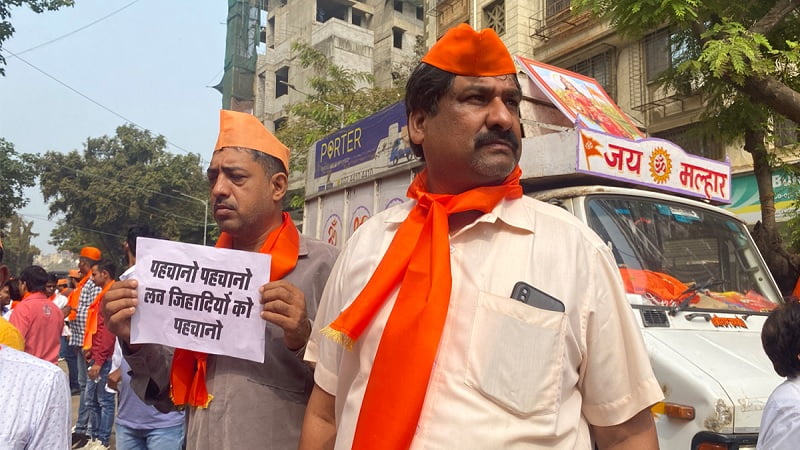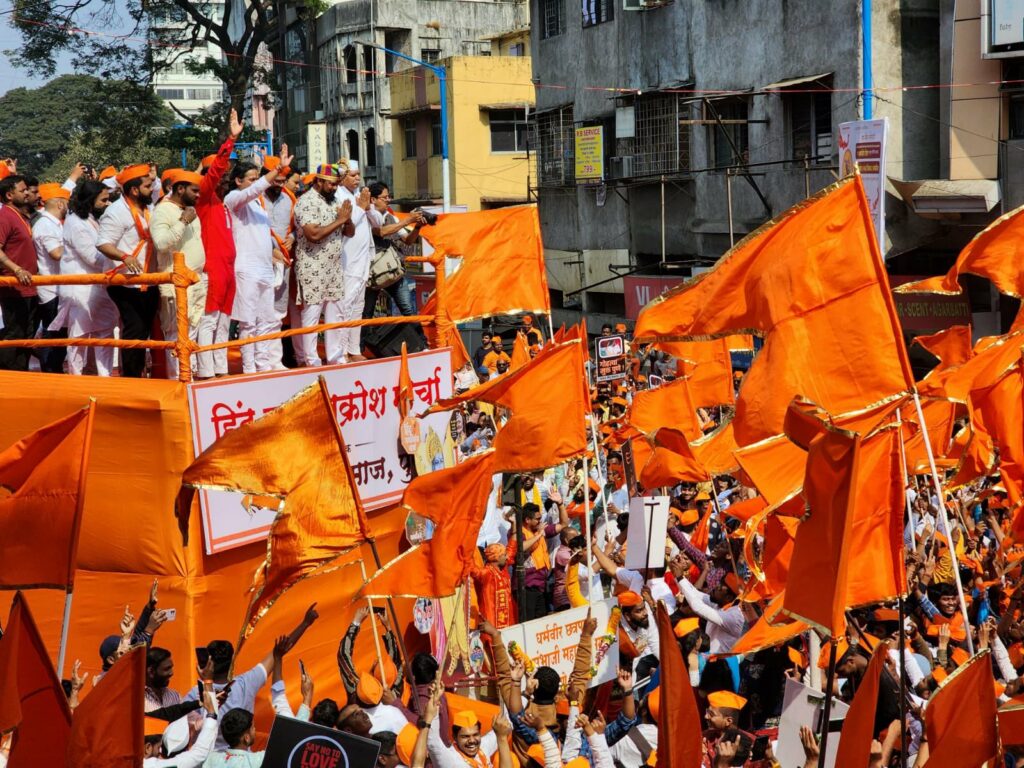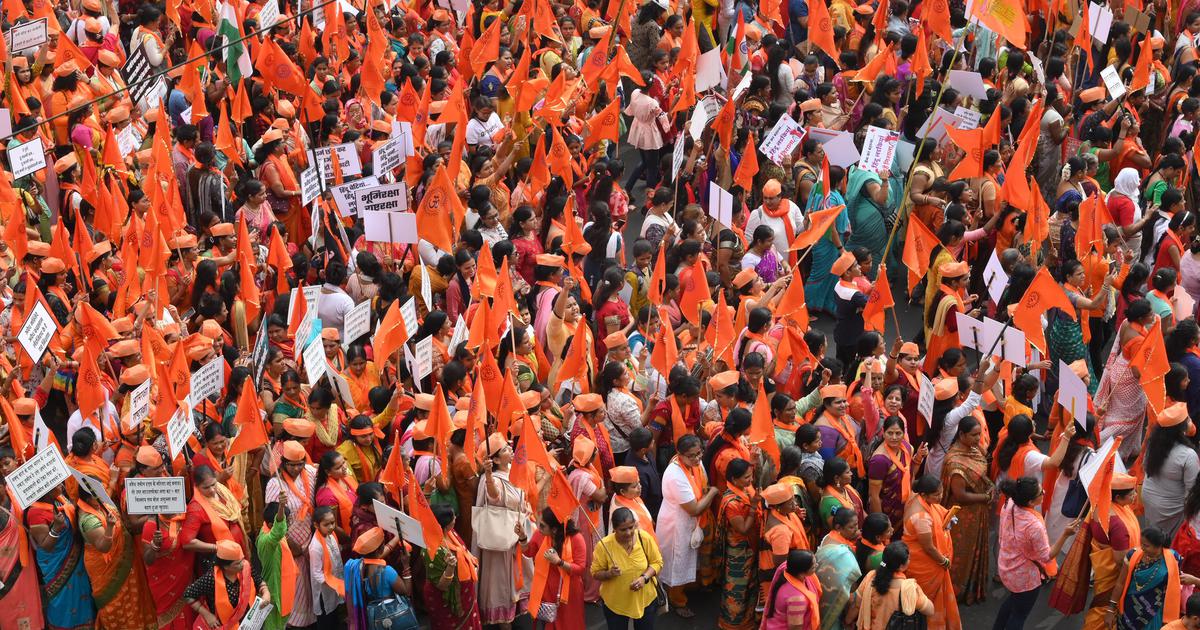The Supreme Court repeated its concerns about the state tackling instances of hate speech in the country. “State is impotent, State is powerless; it does not act in time. Why do we have a State at all if it is remaining silent?”, Justice KM Joseph aired his anguish during the hearing. This concern came up when the bench was considering a contempt petition filed against the State of Maharashtra following their failure to tackle instances of hate speech in the ‘Sakal Hindu Samaj’ rallies.
Also Read: Gaslighting 101: How PM Modi Lied In His Ramlila Maidan Speech
The Telegraph reported the bench’s observation regarding the petition: “Every day, fringe elements are making speeches to vilify others, including on TV and at public forums. The problem arises when politicians are mixing politics with religion. The moment politics and religion are segregated, this will come to an end. When politicians stop using religion, all these things will come to a stop,” a bench of Justices K.M. Joseph and B.V. Nagarathna observed while refusing to discharge the Maharashtra government in a contempt petition.
What is hate speech?
According to Section 153A of the Indian penal code, citizens are prohibited from creating disharmony or feelings of enmity, hatred or ill-will between different groups of people. This is the closest that we can come to tackling hate speech legally. However, India does need a definition of what exactly can be defined as hate speech, which also takes into account recent disruptions aimed at a certain community.
According to a report published by the Indian Express, 50 rallies have been organised across districts in the state of Maharashtra since November 2022. These rallies are supposedly to ‘save the Hindus’ by speaking out against ‘love jihad, forceful conversions, & land jihad’. A rally like this is called the ‘Sakal Hindu Samaj’—a coalition of several Hindu nationalist outfits—that aims at continuing these rallies until the government brings in laws to ‘safeguard the Hindu religion’, according to the Quint.

In his book ‘The Harm in Hate Speech’, Jeremy Waldron writes: “In its published, posted, or pasted-up form, hate speech can become a world-defining activity, and those who promulgate it know very well—this is part of their intention—that the visible world they create is a much harder world for the targets of their hatred to live in”. In a country like India, which is a mix of ethnic, religious, and cultural communities, it is crucial to understand the difference between hate speech and free speech.
Hate speech and rallies
According to a report published by the Indian Express, 50 rallies have been organised across districts in the state of Maharashtra since November 2022. These rallies are supposedly to ‘save the Hindus’ by speaking out against ‘love jihad, forceful conversions, & land jihad’. A rally like this is called the ‘Sakal Hindu Samaj’—a coalition of several Hindu nationalist outfits—that aims at continuing these rallies until the government brings in laws to ‘safeguard the Hindu religion’, according to the Quint.
After the major political shift in Maharashtra in which the BJP came to power along with the Eknath Shinde faction of the Shiv Sena. The State’s deputy CM, Devendra Fadnavis, has said that the state needs to acknowledge these rallies—nearly 40-50, with a turnout of almost 50,000 in each—due to the ‘demand’ for them ‘from within the society’. With the political atmosphere leaning toward the right, and right-wing hardliners organising these rallies with increasing frequency, it is not far-fetched to assume that the instances of hate speech against Muslims are only going to escalate.
According to The Tribune, the apex court observed in February 2023 that there can be no scope for hate crimes on the basis of religion in a secular country like India, while hearing the plea of a Muslim man who had alleged that he was assaulted and abused in the name of religion on July 4, 2021, by a gang of criminals as he had boarded a car to go to Aligarh from Noida and that the police had not bothered to register any complaint of hate crime. The bench—comprising Justices KM Joseph and BV Nagarathna had said, “When action is not taken against hate crimes, then an atmosphere is fostered which is very dangerous and it has to be rooted out from our lives. There cannot be any compromise on hate speech at all.”

With regards to the contempt petition against the State of Maharashtra, the court sought the Maharashtra government’s response to a contempt petition for failing to take action against those engaged in making hate speeches targeting a community at gatherings across the state. The top court gave the state 4 weeks’ time to file its reply and is now posting the matter to the 28th of April, 2023.
Can the Supreme Court fix the hate speech problem?
This case is fresh in the long line of cases filed in the SC, seeking their redressal on hate speech and its boundaries in the Indian context. Despite the apex court’s repeated orders, it is with the authorities that the true fault lies in not being able to curb hate speech.
Also Read: Are Our laws Efficient In Deterring Hate Speech Flaring Through Media?
However, despite the court laying down several measures—including asking the states to file their responses on the actions taken to prevent hate speech (on the SC’s orders, register cases against hate speech under the relevant Sections without waiting for a complaint to be filed, and strict directives to State governments to ensure that there is no hate speech in rallies—the rallies under the vague banner of ‘Sakal Hindu Samaj’ have not taken cognizance of these orders and the government hasn’t either.
According to Scroll, presently, a two-judge bench of the Supreme Court led by Justice KM Joseph is hearing at least 12 petitions relating to regulating hate speech. Most of these cases are targeted at the Muslim community, with one particular petition dealing with the call to arms against Muslims in numerous rallies throughout the country. Another petition was about speeches given in Delhi calling for Muslims to be lynched & boycotted. Petitioners filed their pleas in the top court after the authorities and the police refused to take action or stop the people who were making these speeches.

However, despite the court laying down several measures—including asking the states to file their responses on the actions taken to prevent hate speech (on the SC’s orders, register cases against hate speech under the relevant Sections without waiting for a complaint to be filed, and strict directives to State governments to ensure that there is no hate speech in rallies—the rallies under the vague banner of ‘Sakal Hindu Samaj’ have not taken cognizance of these orders and the government hasn’t either.
So, why is the state being unable to tackle hate speech? Apart from an ignorance of the strict directives of the SC, it is the political motives behind these rallies that make influential leaders turn a blind eye to rampant calls for lynching and the so-called ‘purification’ of the ‘Hindu Samaj’.
Also Read: Why Must Hate Speech Against Muslims In India Be Condemned?
After the major political shift in Maharashtra in which the BJP came to power along with the Eknath Shinde faction of the Shiv Sena. The State’s deputy CM, Devendra Fadnavis, has said that the state needs to acknowledge these rallies—nearly 40-50, with a turnout of almost 50,000 in each—due to the ‘demand’ for them ‘from within the society’. With the political atmosphere leaning toward the right, and right-wing hardliners organising these rallies with increasing frequency, it is not far-fetched to assume that the instances of hate speech against Muslims are only going to escalate.
About the author(s)
A 23-yr old aspiring recluse who's always looking to superimpose cinema, art, philosophy, writing, and literature on one another. Gulping books and coffee is second nature, the first is cynicism.




